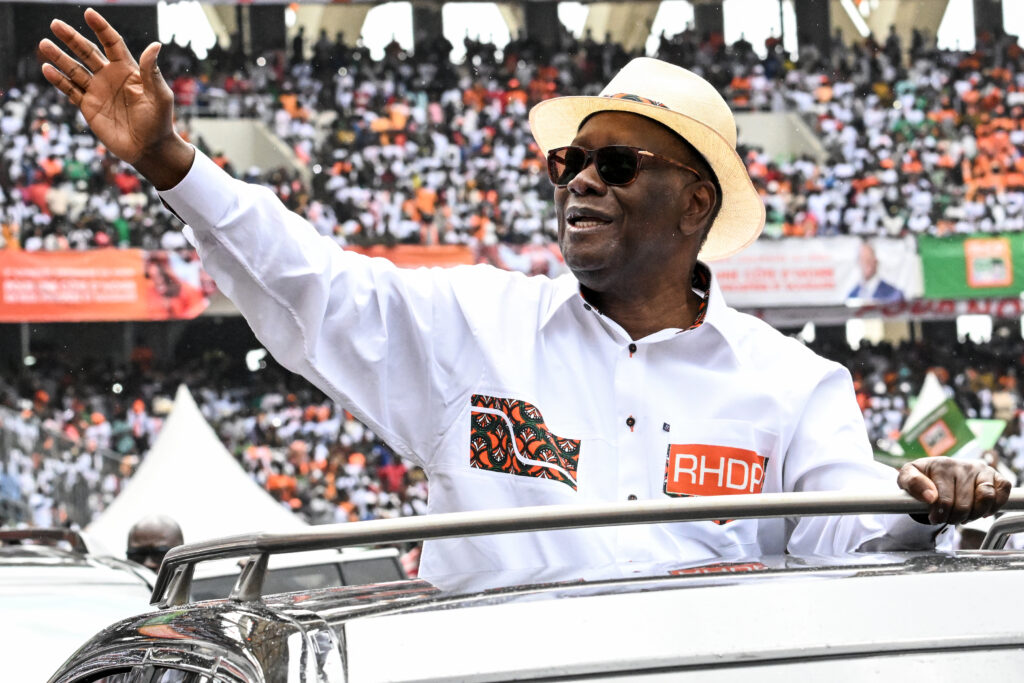A US-trained economist who appears to be an almost immovable cornerstone of Ivory Coast’s political life, President Alassane Ouattara is the favourite to win a fourth term in Saturday’s presidential election.For his admirers, he spells stability and is their natural leader.His detractors accuse him of ruling the country with an iron fist and of choosing his electoral opponents, stressing that courts have barred the main opposition leaders from standing in this week’s vote.”Africa has very few leaders like Ouattara. He has experience, serenity and knowledge of the world. “He is an essential interlocutor in the region,” a close associate said.But for the opposition, the man who has been head of state since 2011 is another African leader who has taken the path of authoritarianism.Ouattara announced in July he was seeking re-election “out of duty”.He assured voters that, now aged 83, he was healthy enough for another term and held campaign rallies across the country, where his party governs an overwhelming majority of cities and regions.He has promised to “do more” for Ivory Coast, while at the same insisting how much the country has improved under his leadership — enjoying transformed infrastructure and stability at a time when other parts of west Africa have faced military coups and jihadist insurgencies. Ouattara had a long career at the International Monetary Fund and Central Bank of West African States before becoming prime minister in 1990.Born in the central town of Dimbokro, Ouattara went to school in neighbouring Burkina Faso, his father’s home country.That fed a controversy over his nationality that has plagued him repeatedly.- Growth but inequality -After the 1993 death of Ivory Coast’s founding leader, Felix Houphouet-Boigny, national unity unravelled. Ouattara was barred from the 1995 vote and five years later faced renewed accusations that he was insufficiently Ivorian.His exclusion is widely seen as a trigger for the 2002 political crisis that split the country for almost a decade.Ouattara’s supporters backed rebels who controlled the north, pitting themselves against then-president Laurent Gbagbo, who held sway in the south.The crisis peaked in 2010 when Ouattara eventually won the presidential election but Gbagbo contested the result, leading to violence which killed 3,000 people and culminated in Gbagbo’s arrest.In office, Ouattara is credited with making good use of his international contacts to pump foreign investment into the war-scarred economy.Fourteen years on, he talks up his macroeconomic record and a nation transformed by growth of more than seven percent almost yearly.But social inequality remains stark and corruption plagues the west African nation.The former French colony and leading cocoa producer is weighed down by a public debt of around 60 percent of GDP, while huge gaps in education and health coverage remain.- ‘Potential successors’ -But security in the Sahel region worsened during Ouattara’s third term. He now has to do business with neighbours led by hostile military juntas — notably in Burkina Faso — who are battling jihadists.Ivory Coast has regained stability but protests are rarely permitted.Despite national reconciliation efforts, few of Ouattara’s supporters have been tried for crimes committed during the 2010-2011 crisis.Gbagbo, who spent eight years in jail at the International Criminal Court in The Hague, was acquitted and returned home in 2021.He was granted a pardon a month later.But the technocratic Ouattara has not offered an amnesty to his long-time rival, who has been excluded from running in this week’s election.”If you don’t give others the ability to fight for power, it’s no longer democracy,” Gbagbo has said.After being re-elected in 2015 with 83 percent of the vote, Ouattara promised not to run again given the two-term presidential limit.But when his chosen successor, Amadou Gon Coulibaly, died suddenly, Ouattara changed his mind, buoyed by a revision of the constitution which he argued reset his number of terms to zero.The move sparked protests. The main opposition boycotted the 2020 election, which the incumbent won with 94 percent of the vote.Ouattara — a Muslim married to a French Christian — says there are “a half-dozen potential successors” in line. For now, they will have to wait.
